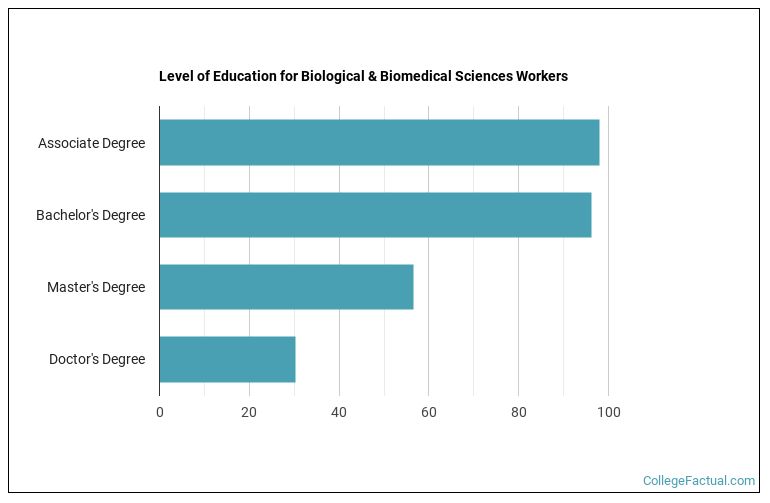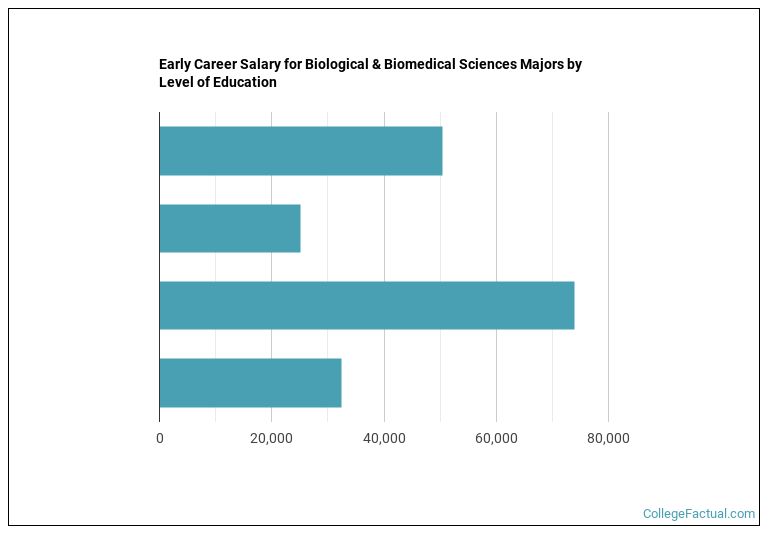 by our College Data Analytics Team
by our College Data Analytics TeamBiological and Biomedical Sciences is all about studying life. You will learn how molecules become cells and how cells become organisms. With many options for majors and concentrations, this is a great field for students who love math, science, nature and the environment.
During your classes you will be required to collect data from the lab and the field. This involves getting outdoors into forests and rivers, as well as examining specimens in the laboratory and under the microscope. You will get very intimate with all different kinds of organisms and explore their populations and their environment. This major is for a student who is ready to work hard in order to gain a strong foundation in biology with strong content knowledge in chemistry, physics, and mathematics.
Students can major in General Biology. However, you also have the opportunity to pick a more specialized major. Ecology involves learning about interactions of living and nonliving things in all sorts of ecosystems. Neurobiology and Neuroscience allows you to study the way the brain functions and the importance of the nervous system as well as the evolution of the brain. If you are more interested in exploring the animal kingdom you may choose to major in Zoology. Students with a more medical bent might be interested in Microbiology Sciences and Immunology, where they will get the chance to study bacteria and infectious disease.
Explore additional the majors in this field of study to see what peaks your interests.
Biological & Biomedical Sciences was the 9th most popular major in the 2021-2022 school year. Colleges in the United States reported awarding 180,206 degrees in this year alone. This year's Best Biological & Biomedical Sciences Schools ranking compares 836 of them to identify the best overall programs in the country. Explore this or one of our many other custom biological & biomedical sciences rankings further below.
Biology is a great field for curious students who love learning about how living organisms grow, adapt and survive. Many of the fields can be quite rigorous and competitive. Be prepared for long hours in the lab doing research, analyzing results and writing lab reports.
Completing your coursework will help you develop critical thinking and analytic skills. You will need to read and evaluate scientific material, learn terminology and memorize formulas. Problem solving skills will help you work through difficult scenarios. Accuracy and attention to detail are absolutely necessary when performing experiments and recording results.
Students will often work with partners or in groups, making communication and collaboration important. You need to be a team player as well as leader. Don't be afraid to listen to theories and perspectives that may challenge your opinions. Work on your writing and speaking skills in order to present information clearly and accurately.
Some programs may require field experience or allow students to pursue internships or independent research. This experience is valuable and will make you more competitive in the workplace.
A high school diploma or equivalent is typically required for most biological & biomedical sciences degree programs and many students will need a minimum GPA and SAT/ACT score depending on the school. Once you obtain your degree, additional biological & biomedical sciences certifications required to pursue a career in this field.
There are many different biological & biomedical sciences degree levels. You can get anything from a in biological & biomedical sciences to the highest biological & biomedical sciences degree, a . The type of biological & biomedical sciences degree you choose will determine how long it takes to get your diploma.
| Degree | Credit Requirements | Typical Program Length |
|---|---|---|
| Associate Degree | 60-70 credits | 2 years |
| Bachelor’s Degree | 120 credits | 4 years |
| Master’s Degree | 50-70 credits | 1-3 years |
| Doctorate | Program required coursework including thesis or dissertation | At least 4 years |
A bachelor's degree is the most common level of education achieved by those in careers related to biological & biomedical sciences, with approximately 36.2% of workers getting one. People currently working in careers related to biological & biomedical sciences tend obtained the following education levels.
| Level of Education | Percentage of Workers |
|---|---|
| Bachelor’s Degree | 35.9% |
| Master’s Degree | 25.1% |
| Doctoral Degree | 16.7% |
| Post-Doctoral Training | 13.9% |
| Post-Baccalaureate Certificate | 3.7% |
56.5% of biological & biomedical sciences workers have at least a master's. The chart below shows what degree level those who work in biological & biomedical sciences have obtained.

This of course varies depending on which biological & biomedical sciences career you choose.
With a strong academic background, graduates with a degree in biology will have the ability to enter many different occupations. Many become lab scientists working for a variety of medical, health or environmental industries. There are many opportunities in the pharmaceutical industry to work as a researcher, developer, sales person, marketer, or medical laboratory assistant.
Some careers in biology will require a minimum of a master's degree. Some careers that biology majors have gone into are professor, biotechnologist, biomedical engineer, lawyer, forensic scientist, or zoologist. Many grads also eventually become doctors, nurses, pharmacists or veterinarians.
Want a job when you graduate with your biological & biomedical sciences degree? Biological & Biomedical Sciences careers are expected to grow 17.1% between 2016 and 2026.
The following options are some of the most in-demand careers related to biological & biomedical sciences.
| Occupation Name | Projected Jobs | Expected Growth |
|---|---|---|
| High School Teachers | 1,095,500 | 7.5% |
| Software Applications Developers | 1,086,600 | 30.7% |
| Computer Workers | 313,800 | 9.3% |
| Health Specialties Professors | 294,000 | 25.9% |
| Medical Scientists | 136,100 | 13.4% |
Recently graduated biological & biomedical sciences students earned an average of $33,944 in <nil>. Earnings can range from as low as $7,145 to as high as $185,874. As you might expect, salaries for biological & biomedical sciences graduates vary depending on the level of education that was acquired.

Salaries for biological & biomedical sciences graduates can vary widely by the occupation you choose as well. The following table shows the top highest paying careers biological & biomedical sciences grads often go into.
| Occupation Name | Median Average Salary |
|---|---|
| Natural Sciences Managers | $139,680 |
| Computer and Information Research Scientists | $123,850 |
| Health Specialties Professors | $122,320 |
| Software Applications Developers | $108,080 |
| Biochemists and Biophysicists | $105,940 |
With over 9,719 different biological & biomedical sciences degree programs to choose from, finding the best fit for you can be a challenge. Fortunately you have come to the right place. We have analyzed all of these schools to come up with hundreds of unbiased biological & biomedical sciences school rankings to help you with this.
| Major | Annual Graduates |
|---|---|
| General Biology | 106,032 |
| Biochemistry, Biophysics & Molecular Biology | 14,558 |
| Neurobiology & Neurosciences | 12,616 |
| Physiology & Pathology Sciences | 9,568 |
| Ecology, Evolution & Systematics Biology | 7,935 |
| Related Major | Annual Graduates |
|---|---|
| Engineering | 192,474 |
| Engineering Technologies | 84,036 |
| Mathematics & Statistics | 50,646 |
| Agriculture & Agriculture Operations | 50,343 |
| Physical Sciences | 49,473 |
Image Credit: By Kelly White under License More about our data sources and methodologies.